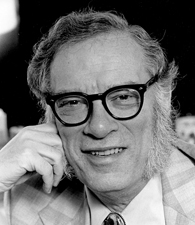In his approximately 500 books, writer Isaac Asimov explained the universe to us; where it had been, where it is now and where it might go in the future. One of the towering figures of science fiction, Asimov wrote stories, novels and nonfiction works on a variety of topics—as well as a series of infamous limericks.
Isaac Asimov’s Early Days
Isaac Asimov was born in the Russian town of Petrovichi on January 2, 1920, the oldest of three children. His parents brought him to America at the age of three; he was naturalized as an American citizen five years later. Asimov taught himself to read and graduated from high school at the age of 15.
His father Judah Asimov ran a series of candy stores, and Asimov was drawn to the science fiction magazines on the shelves. Eventually, he decided that he could probably do just as well as the authors he was reading. When Asimov was 19, one of his short stories, “Marooned Off Vesta,” was published in the March 1939 edition of Amazing Stories. In 1941, he sold “Nightfall” to Astounding Science Fiction.
Asimov attended Columbia University, where he earned an undergraduate degree in science, a Masters and a PhD in chemistry by the age of 28. He spent the first half of the 1950s as a biochemistry professor at Boston University’s School of Medicine, but realized early on that he really wanted to devote himself to writing.
Sources in this Story
- NPR Fresh Air: Robot Maker: A Talk with the Late Isaac Asimov
- Biography.com: Isaac Asimov Biography (1920–1992)
- Fantastic Fiction: Isaac Asimov
- Bill Moyers Journal: Bill Moyers Rewind: Isaac Asimov (1988)
- Locus Online: Letter from Janet Asimov
Notable Accomplishments
Asimov published his first science fiction novel, “Pebble in the Sky,” in 1950. He went on to write approximately 500 books (no one can quite agree on the exact count), that encompassed both short story collections and multi-novel series that etched out whole universes to explore, all employing his considerable scientific knowledge to ground his tales in tangible fact.
The science fiction community honored Asimov’s contributions to the genre, granting him two of their most prestigious awards several times: the Hugo (five times) and the Nebula (three times). He was named a Grand Master by the Science Fiction and Fantasy Writers of America in 1987.
Asimov also wrote nonfiction works for scholars, laymen, and children that explored religion, science, history and literature, to mention a few.
The Rest of the Story
While his imagination roamed the galaxies, Asimov himself traveled very little; he preferred to remain in New York City and had a notorious fear of flying. He was married twice, and had two children from his first marriage.
In 1983, Isaac Asimov received HIV-infected blood during triple bypass surgery. He died from complications of AIDS on April 6, 1992. His influence in the world of science fiction remains unabated. Several authors have written books set in the universes Asimov created, and the magazine Asimov’s Science Fiction is named after him.
This article was originally written by Christopher Coats; it was updated January 4, 2018.











